Related Research Articles

Vivien Leigh, styled as Lady Olivier after 1947, was a British actress. She won the Academy Award for Best Actress twice, for her performances as Scarlett O'Hara in Gone with the Wind (1939) and Blanche DuBois in the film version of A Streetcar Named Desire (1951), a role she had also played on stage in London's West End in 1949. She also won a Tony Award for her work in the Broadway musical version of Tovarich (1963). Although her career had periods of inactivity, in 1999 the American Film Institute ranked Leigh as the 16th-greatest female movie star of classic Hollywood cinema.

Bad Taste is a 1987 New Zealand science-fiction comedy horror film directed, produced and filmed by Peter Jackson, who also starred in it and co-wrote the screenplay, along with Tony Hiles and Ken Hammon. Independently produced on a low budget, it is Jackson's first feature film. Jackson and friends take on most of the key roles, both on and off-screen. The plotline sees aliens invade the fictional New Zealand village of Kaihoro to harvest humans for their intergalactic fast food franchise, where they face off against a four-man paramilitary force. The film provided Jackson with the leverage necessary to advance in the film industry.
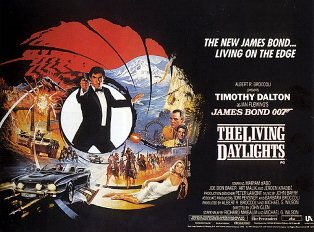
The Living Daylights is a 1987 spy film, the fifteenth entry in the James Bond series produced by Eon Productions, and the first of two to star Timothy Dalton as the fictional MI6 agent James Bond. Directed by John Glen, the film's title is taken from Ian Fleming's short story "The Living Daylights", the plot of which also forms the basis of the first act of the film. It was the last film to use the title of an Ian Fleming story until the 2006 instalment Casino Royale. It is also the first film to have Caroline Bliss as Miss Moneypenny, replacing Lois Maxwell. The film was produced by Albert R. Broccoli, his stepson Michael G. Wilson, and co-produced by his daughter, Barbara Broccoli. The Living Daylights grossed $191.2 million worldwide, and received mixed reviews from critics.
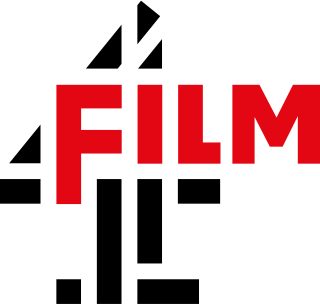
Film4 Productions is a British film production company owned by Channel Four Television Corporation. The company has been responsible for backing many films made in the United Kingdom. The company's first production was Walter, directed by Stephen Frears, which was released in 1982. It is especially known for its gritty, kitchen sink-style films and period dramas.

Paul Hogan is an Australian actor and comedian. He was nominated for the Academy Award for Best Original Screenplay and won the Golden Globe Award for Best Actor – Motion Picture Musical or Comedy for his performance as outback adventurer Michael "Crocodile" Dundee in Crocodile Dundee (1986), the first in the Crocodile Dundee film series.

Crocodile Dundee II is a 1988 American action comedy film and the second of the Crocodile Dundee film series. It is a sequel to Crocodile Dundee (1986) and was followed by Crocodile Dundee in Los Angeles (2001). Actors Paul Hogan and Linda Kozlowski reprise their roles as Mick Dundee and Sue Charlton, respectively, here shown opposing a Colombian drug cartel.
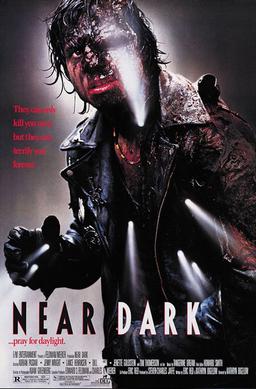
Near Dark is a 1987 American neo-Western horror film co-written and directed by Kathryn Bigelow, and starring Adrian Pasdar, Jenny Wright, Bill Paxton, Lance Henriksen and Jenette Goldstein. The plot follows a young man in a small Oklahoma town who becomes involved with a family of nomadic American vampires.
The Australian New Wave was an era of resurgence in worldwide popularity of Australian cinema, particularly in the United States. It began in the early 1970s and lasted until the mid-late 1980s. The era also marked the emergence of Ozploitation, a film genre characterised by the exploitation of colloquial Australian culture.

South Australian Film Corporation (SAFC) is a South Australian Government statutory corporation established in 1972 to engage in film production and promote the film industry, located in Adelaide, South Australia. The Adelaide Studios are managed by the South Australian Film Corporation for the use of the South Australian film industry.
Ozploitation films are exploitation films – a category of low-budget horror, comedy, sexploitation and action films – made in Australia after the introduction of the R rating in 1971. The year also marked the beginnings of the Australian New Wave movement, and the Ozploitation style peaked within the same time frame.
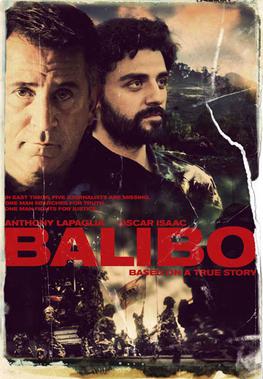
Balibo is a 2009 Australian war film that follows the story of the Balibo Five, a group of journalists who were captured and killed while reporting on activities just prior to the Indonesian invasion of East Timor of 1975. The film is loosely based on the 2001 book Cover-Up by Jill Jolliffe, an Australian journalist who met the men before they were killed.
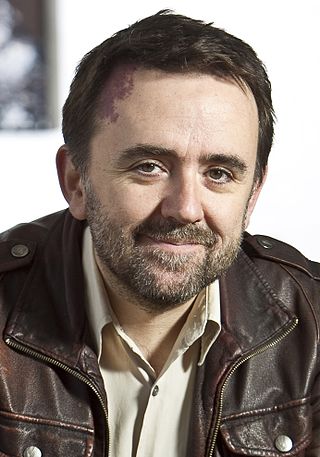
Robert Connolly is an Australian film director, producer and screenwriter based in Melbourne, Victoria. He is best known as the director and writer of the feature films Balibo, Three Dollars and The Bank, and the producer of Romulus, My Father and The Boys. He is head of the film distribution company, Footprint Films, owned by Arenafilms.
Bill Bennett is an Australian film director, producer and screenwriter.

Samantha Lang is an Australian film director and screenwriter. Her production company is Handmaid Media.
Guy Gross is an Australian film and television composer. He is known most for writing the award-winning music for the Australian science fiction series Farscape and the international hit film The Adventures of Priscilla, Queen of the Desert. He also composed for the animated television series Blinky Bill and Dumb Bunnies. He has 91 credits as screen composer.
Touch the Sun is a series of television films commissioned by Patricia Edgar for the Australian Children's Television Foundation. It was to be the ACTF's project for the Australian Bicentenary celebrations in 1988. The Australian Bicentennial Authority named Touch the Sun as the Bicentenary official children's series for 1988. Edgar's plan was to locate stories in every state in Australia showing the diversity of the Australian landscape. It was directed, written and produced by some of the top film and tv personnel in Australia. Patricia Edgar was Executive Producer of the show and it was backed by the ABC, Australian Film Commission, the New South Wales Film Corporation, the South Australian Film and Television Financing Fund, the South Australian Film Corporation, Film Victoria and the French distribution company Revcom International. National Trustees agreed to act as investor representatives for Touch the Sun in 1986 and the series was offered to the Australian Television networks for telecast in 1988. The $7.5 million necessary for production of this unique children’s series for the Bicentennial year was fully subscribed by 30 June 1987. The ABC paid $2 million for the Australian rights to Touch the Sun, the most the ABC had ever spent to acquire the rights to a program.

Day of the Panther and Strike of the Panther are two Australian direct-to-video martial arts action films directed by Brian Trenchard-Smith in 1987 starring Edward Stazak as Jason Blade. The films were shot at the same time and released consecutively.

The Australian Directors' Guild (ADG) is an industry guild representing the interests of film, television, commercials and digital media directors, including documentary makers and animators, throughout Australia. With its headquarters in Sydney, the ADG has branches in New South Wales, Queensland, South Australia, Victoria and Western Australia. As of 2022 the president of ADG is Rowan Woods.
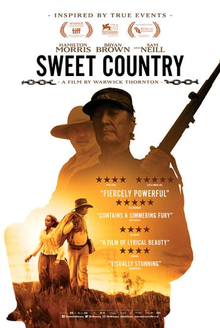
Sweet Country is a 2017 Australian drama film, directed by Warwick Thornton. Set in 1929 in the sparsely populated outback of the Northern Territory and based on a series of true events, it tells a harsh story against the backdrop of a divided society in the interwar period in Australia.
The Australian Guild of Screen Composers (AGSC) is a not for profit organisation, which was established in 1981, "to represent the interests of Australian screen composers by developing and promoting employment opportunities, undertaking educational initiatives and increasing their profile amongst the industry." It was established by Bruce Smeaton and Bruce Rowland. The Guild's head offices are in Sydney, with successive presidents from 1987 being Bob Young (1987–91), Martin Armiger (1992–98), Chris Neal (1999–2000), Art Phillips (2001–08), Clive Harrison (2008–11), Guy Gross (2012–17), Caitlin Yeo (2018–20) and Antony Partos (2020–present). Since 1991 it has been sponsored by the Australasian Performing Right Association (APRA).
References
- ↑ "The company of eccentrics". Filmnews . Vol. 18, no. 11. New South Wales, Australia. 1 December 1988. p. 6. Retrieved 28 March 2016– via National Library of Australia.
- ↑ With Time to Kill at MIFF